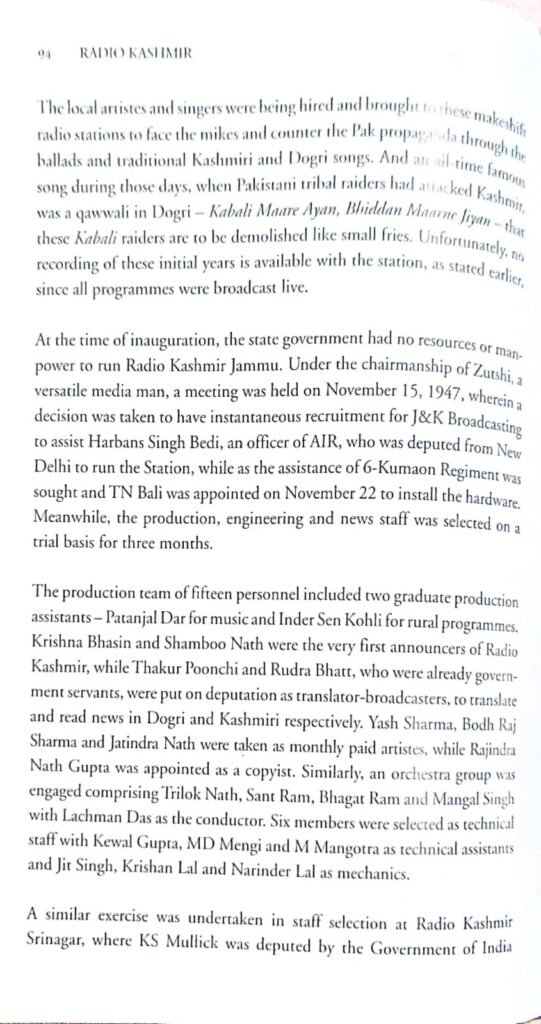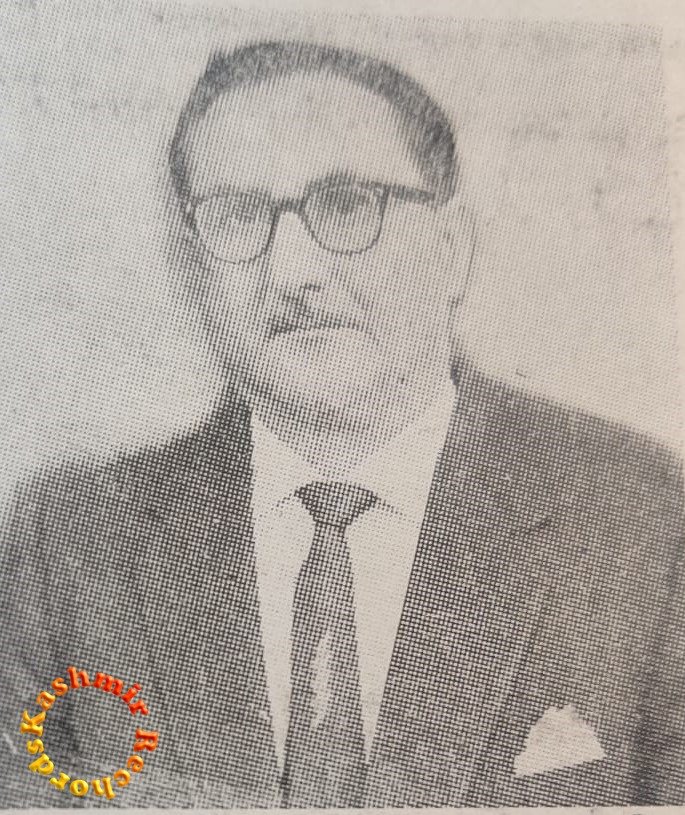(Kashmir Rechords Exclusive)
Meet J N Zutshi—the first Director General of Radio Kashmir who also held the post of the Secretary, J&K State Information & Broadcasting. Zutshi is credited to have set up two Radio Stations in Jammu and Kashmir—first at Jammu on December 1, 1947 and then at Srinagar on July 1, 1948. All he had to do through these two Radio Stations, was to counter the malicious Pakistani propaganda against India especially from Pakistani’s notorious underground Radio Station–“ Radio Trarkhal’’.

Archival file on Radio Kashmir
There is a separate file on the establishment of Radio Kashmir that has been preserved in the archival section of the Department of Archives and Museums at Jammu. A detailed study of the file reveals many interesting facts.
J. N. Zutshi was the first Director-General of Radio Kashmir, who also held the post of the Secretary, State Information and Broadcasting Ministry. He was the one to recruit the staff for Radio Jammu. Zutshi’s contemporary was P. C. Choudhery, who was the Director-General of All-India Radio in 1947-48.
The proposal to establish a State-run Radio Station was taken by Maharaja Hari Singh on November 15, 1947, and within two weeks, the Station was established with the active support of Government of India when Sardar Vallabh Bhai Patel was also looking after the portfolio of the Union Ministry of Information and Broadcasting.
In his first-ever radio speech from Jammu (on December 1, 1947 at 6.30 pm), the Maharaja Hari Singh had justified his decision to accede to the Union of India. A number of national and foreign newspapers, which had their representatives in Srinagar and Jammu, carried his speech quite prominently. J N Zutshi was the person, who had ensured that the speech goes on air uninterrupted from the two classrooms of a local School where Radio Kashmir Jammu was initially set-up.
Selection of Staff for Radio Kashmir
On the instructions of J N Zutshi, local artistes and singers were being hired and brought to these makeshift radio stations (both at Jammu and Srinagar) to face the mikes live and counter the Pak propaganda through the ballads and traditional Kashmiri and Dogri songs. There was no provision for recording.
At the time of inauguration, the State Government had no resources or man- power to run Radio Kashmir. Under the chairmanship of Zutshi, a versatile media man, a meeting was held on November 15, 1947, wherein a decision was taken to have instantaneous recruitment for J&K Broadcasting to assist Harbans Singh Bedi, an officer of All India Radio (AIR), who was deputed from New Delhi, while as further engineering assistance of 6-Kumaon Regiment was sought. TN Bali was appointed on November 22, 1947 to install the hardware. Meanwhile, the production, engineering and news staff was selected on a trial basis for three months.

The production team of fifteen personnel included two graduate production assistants-Patanjal Dar for music and Inder Sen Kohli for rural programmes. Krishna Bhasin and Shamboo Nath were the first announcers of Radio Kashmir, while Thakur Poonchi and Rudra Bhatt, who were already government servants, were on the orders of Zutshi, put on deputation as translator-broadcasters, to translate and read news in Dogri and Kashmiri respectively. Yash Sharma, Bodh Raj Sharma and Jatindra Nath were taken on contract as monthly paid artistes, while Rajindra Nath Gupta was appointed as a copyist. Similarly, an orchestra group was engaged comprising Trilok Nath, Sant Ram, Bhagat Ram and Mangal Singh with Lachman Das as the conductor. Six members were selected as technical staff with Kewal Gupta, MD Mengi and M Mangotra as technical assistants and Jit Singh, Krishan Lal and Narinder Lal as mechanics. A similar exercise was undertaken in staff selection at Radio Kashmir Srinagar, where KS Mullick was deputed by the Government of India.
Zutshi’s proximity to Sheikh Abdullah
Apart from being the first Director General of Radio Kashmir, J N Zutshi had also setup the Field Publicity Organisation of J&K Government that was equipped with mobile vans and loud speakers. These vans used to move in different parts of Jammu and Kashmir presenting to the common man entertainment as well as political awareness. For his proximity to Sheikh Mohd Abdullah, Zutshi as a gifted writer, used to write all his speeches and later for Bakshi Ghulam Mohd.

It was on December 13, 1949 that Sheikh Mohammad Abdullah as Prime Minister of Jammu & Kashmir and member of the Indian Delegation, accompanied by J.N. Zutshi left New Delhi for New York to assist N.N. Rau, India’s Permanent representative with the U.N in presenting India’s case before the Security Council.
From 1947 to 1953, all-important political documents of Jammu and Kashmir were drafted by Zutshi and he enjoyed Sheikh’s full confidence. It was because of his proximity to Sheikh Abdullah that Zutshi was also imprisoned in 1953 for some time.
From Radio Kashmir to AIR to Akashvani
Radio Kashmir, which started functioning as a State Department under J N Zutshi, was later fully merged with All India Radio in April 1954. The Institution had, however, retained the identity as “Radio Kashmir’’ to meet the specific strategic requirements of the country, the details of which are exhaustively covered in a well-researched book ``Radio Kashmir in Times of Peace and War’’. However, in October 2019, the name “Radio Kashmir’’ was abruptly dropped and both Srinagar and Jammu Stations were first prefixed as `All India Radio’ and then in 2023, as `Akashvani’.


Simply beautiful. I learned a lot from this archival report on Radio Kashmir and Mr. Zutshi.
Thanks for liking our archival material. We will continue to bring more such precious information on http://www.kashmir-rechords.com
[…] 📌 J. N. Zutshi – The First Director General of Radio KashmirRead more […]